Ancient Near East - Iron Age - Photo gallery
Image database with photographs of ancient art and antiquities
Our image database provides photographs of ancient art and antiquities for press releases as well as for private use. All artefacts sold in our gallery are documented through professional photographs. The resulting image library contains numerous ancient Egyptian, Greek and Roman antiquities as well as ancient coins. The time span from Stone Age, over Bronze Age and Classical Antiquity until Late Antiquity is covered.The photo gallery aims at providing a vast visual archive equipped with filters and search tools. You are most welcome to search the constantly growing number of artefacts in the image library. We are also happy to authorize hyperlinks from your webpage / forum to the objects depicted in our gallery. For this purpose, please send us a short notification prior to placing a hyperlink. For almost every object high definition photographs are available and can be provided e.g. to document your collection or for scientific papers or popular science articles. If you are interested in using pictures for publications, print media or other purposes, please contact us and we will be happy to assist you.
-
 Phoenician eye bead
Phoenician eye beadPolychrome glass bead with stylized elements of a face as protection against the evil eye. Produced in Carthage or the Phoenician homeland, 4th to 3rd century BC.
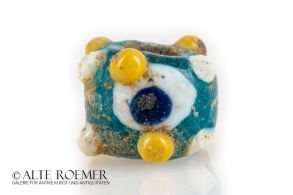 Phoenician eye bead
Phoenician eye beadPolychrome glass bead with stylized elements of a face as protection against the evil eye. Produced in Carthage or the Phoenician homeland, 4th to 3rd century BC.
Price: on request Phoenician eye bead
Phoenician eye beadPolychrome glass bead with stylized elements of a face as protection against the evil eye. Produced in Carthage or the Phoenician homeland, 4th to 3rd century BC.
Price: on request Necklace of ancient eye beads
Necklace of ancient eye beadsModernly threaded necklace made of 82 ancients beads from the 1st millennium BC. From the eastern Mediterranean. Ex Christie's.
 Iron Age bronze belt
Iron Age bronze beltWide bronze belt with five wild animals in repoussé. From the biblical land of Ararat, the Urartian Empire around 700 BC.
 Luristan bronze dagger
Luristan bronze daggerIron Age bronze weapon originating from the Luristan region in Ancient Iran. Well preserved.
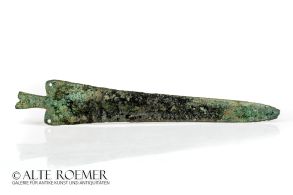
 Near Eastern spearhead
Near Eastern spearheadDouble-edged blade of a spear from Bronze or Early Iron Age. With a nice green patina.
 Horse bit from Luristan
Horse bit from LuristanDelightful artefact attesting the dawn of horse breeding in Western Iran during the 8th century BC. Two joined triangles form the cheek pieces.
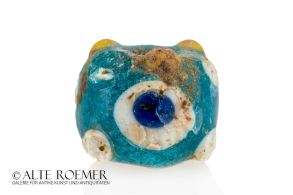 Phoenician eye bead
Phoenician eye beadPolychrome glass bead with stylized elements of a face as protection against the evil eye. Produced in Carthage or the Phoenician homeland, 4th to 3rd century BC.
Price: on request Phoenician eye bead
Phoenician eye beadPolychrome glass bead with stylized elements of a face as protection against the evil eye. Produced in Carthage or the Phoenician homeland, 4th to 3rd century BC.
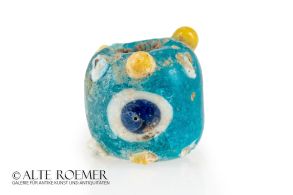 Phoenician eye bead
Phoenician eye beadPolychrome glass bead with stylized elements of a face as protection against the evil eye. Produced in Carthage or the Phoenician homeland, 4th to 3rd century BC.
Price: on request Sasanian stamp seal
Sasanian stamp sealVery nice dome-shaped seal made of stone. The piece is from the period of Sasanian rule in the Near East.
Price: on request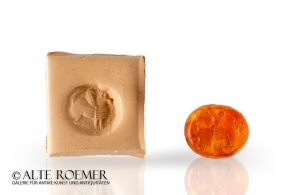 Sasanian stamp seal
Sasanian stamp sealVery nice dome-shaped seal made of stone. The piece is from the period of Sasanian rule in the Near East.
Price: on request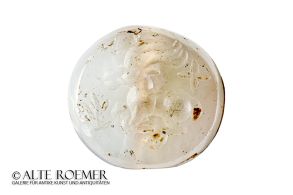 Sasanian stamp seal
Sasanian stamp sealVery nice dome-shaped seal made of stone. The piece is from the period of Sasanian rule in the Near East.
 Sasanian stamp seal
Sasanian stamp sealVery nice dome-shaped seal made of stone. The piece is from the period of Sasanian rule in the Near East.
 Sasanian gilt silver bowl
Sasanian gilt silver bowlMagnificent example of Sassanid craftsmanship of the highest quality. With a gilded bas-relief of a dancing woman in the tondo. Ex Sotheby's.
 Sasanian silver bowl
Sasanian silver bowlGood example of high quality Sassanid craftsmanship. Acquired at Sotheby's in 1981.
 Bronze dagger from North Iran
Bronze dagger from North IranShort bladed weapon from Iron Age Iran. It is probably a find from the province of Gilan in northern Iran.
 Luristan bronze figurine of an ibex
Luristan bronze figurine of an ibexMassive bronze pendant in the shape of a standing ibex with long horns. From Iron Age Luristan.
Price: on request Clay figurine of the goddess Astarte
Clay figurine of the goddess AstarteMold made clay figure dating to the first Millennium BC. The Semitic goddess represents love, sexuality, war, healing, and more.
Price: on request Cypriot limestone statuette
Cypriot limestone statuetteYoung man with a bag in his hand, in the style of a kouros. The typical votary statuette from Cyprus was exported to Israel in the Cypro-Archaic period. With certificate from 1984.
 Published Canaanite oil lamp from Adler collection
Published Canaanite oil lamp from Adler collectionShallow bowl with pinch for the wick, typical for the late Iron Age in Southern Israel. From the famous Judge Dr. Steve Adler collection. Exported from Israel with IAA permit Nr. 53397.
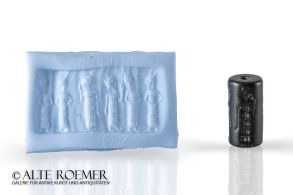 Near Eastern cylinder seal
Near Eastern cylinder sealThe seal of black stone bears a scene with four noblemen or gods. Late Syrian, around 1500 BC.
Price: on request Terra cotta idol from Syria
Terra cotta idol from SyriaCharacteristic figure for the Bronze Age in the region that is today northern Syria. Dating to the 3rd or early 2nd Millennium BC.
Price: on request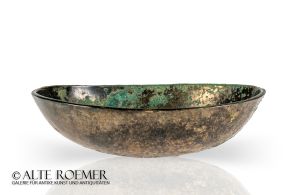 Sasanian silver bowl
Sasanian silver bowlGood example of high quality Sassanid craftsmanship. Acquired at Sotheby's in 1981.
 Luristan hatchet with eyes
Luristan hatchet with eyesAxe head originating from the Luristan region during Iron Age. The piece is decorated with eyes to form a stylized bird's head.
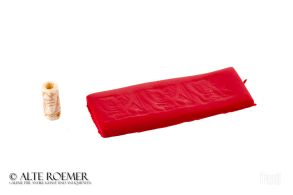 Mesopotamian cylinder seal
Mesopotamian cylinder sealThe marble seal bears a fight scene with lions. From the Early Dynastic or Akkadian period in the later 3rd Millennium BC.
Price: on request Luristan axe head
Luristan axe headBronze axe originating from the Luristan region during Bronze Age. From the Sasson family collection.
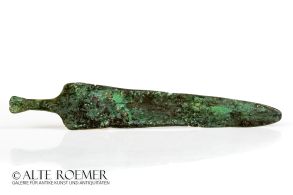 Luristan bronze dagger
Luristan bronze daggerDouble-edged blade of a short dagger from the Luristan region in Ancient Iran. An early type from the Middle Bronze Age.
 Luristan bronze dagger
Luristan bronze daggerDouble-edged blade of a dagger from the Luristan region in Ancient Iran. An early type from the Middle Bronze Age.
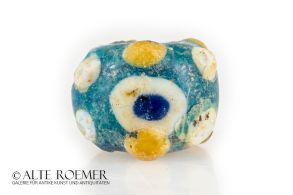 Phoenician eye bead
Phoenician eye beadPolychrome glass bead with stylized elements of a face as protection against the evil eye. Produced in Carthage or the Phoenician homeland, 4th to 3rd century BC.
Price: on request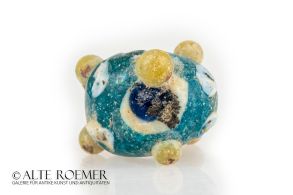 Phoenician eye bead
Phoenician eye beadPolychrome glass bead with stylized elements of a face as protection against the evil eye. Produced in Carthage or the Phoenician homeland, 4th to 3rd century BC.
Price: on request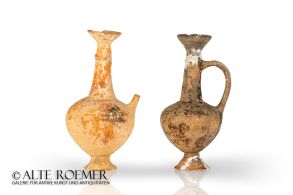 Two cypriot juglets
Two cypriot jugletsSo-called Bilbil jugs of the Base Ring I ware. A testament to the opium trade of the late Bronze Age.
 Luristan bronze standard with master of animals
Luristan bronze standard with master of animalsBronze finial from Iron Age Northern Iran. Decorated by stylized panthers and a janus headed hero or god. Possibly a teraphim, a house god, as referred to in the Old Testament.
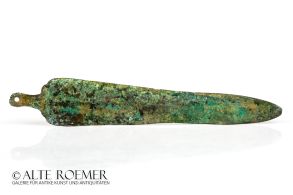 Luristan bronze dagger
Luristan bronze daggerDouble-edged blade of a short dagger from the Luristan region in Ancient Iran. An early type from the Middle Bronze Age.

